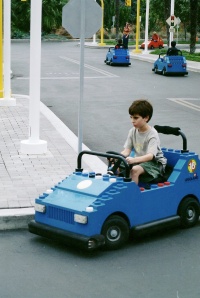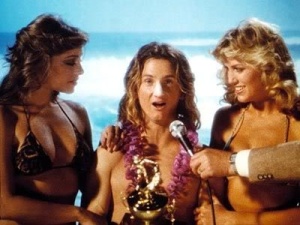 Andy recently picked up a marked-down copy of Fast Times at Ridgemont High as a bit of a joke and so we all cozied in together for family film night last Saturday—a rare window with no sleepovers or plans and both kids willing to do the same thing as both parents (for example, they all like House but I can’t watch without thinking that I have the ailment of the episode).
Andy recently picked up a marked-down copy of Fast Times at Ridgemont High as a bit of a joke and so we all cozied in together for family film night last Saturday—a rare window with no sleepovers or plans and both kids willing to do the same thing as both parents (for example, they all like House but I can’t watch without thinking that I have the ailment of the episode).
Fast Times hit the theaters in 1982. I had just moved to New York City and started in graduate film school—and it was a film I fell in love with as an aspirational possibility because it was funny, edgy, intelligent, subversive and at the same time a commercial success on a relatively modest budget. It was the sort of film an up and coming filmmaker could hope to emulate (as opposed to say, Blade Runner, E.T. and Gandhi as other “big” movies that year).
I always appreciated Fast Times as a seminal work in the teen genre, feeling that it drew from films ranging from Grease to Rebel Without a Cause while making everything from Valley Girl, Bill and Ted’s Excellent Adventure, the entire John Hughes oeuvre to American Pie and Superbad possible in its wake. One thing I always particularly appreciated about Fast Times was that Amy Heckerling’s direction brought a woman’s touch to teen sex and social relationships, adding layers of pathos, melancholy and verisimilitude while keeping things funny. Back in ’82 it was still a big deal for a woman to be directing… very much paving the way for Katherine Bigelow’s Oscar this year with heavier fare.
 Heckerling’s casting was also visionary—introducing us to Sean Penn in the unforgettable role of Jeff Spicoli (“Well Stu I’ll tell you, surfing’s not a sport, it’s a way of life, you know, a hobby. It’s a way of looking at that wave and saying, “Hey bud, let’s party!””). Watching Fast Times with my kids, they immediately wanted to know if “the stoner” was going to be in it more as the film unfolded. Penn is electric, even as a complete goofball he’s able to combine outrageousness with sheer likeability and a winning undertone of pathos.
Heckerling’s casting was also visionary—introducing us to Sean Penn in the unforgettable role of Jeff Spicoli (“Well Stu I’ll tell you, surfing’s not a sport, it’s a way of life, you know, a hobby. It’s a way of looking at that wave and saying, “Hey bud, let’s party!””). Watching Fast Times with my kids, they immediately wanted to know if “the stoner” was going to be in it more as the film unfolded. Penn is electric, even as a complete goofball he’s able to combine outrageousness with sheer likeability and a winning undertone of pathos.
In other casting, even though it’s a nothing part (the angry big football player), the fact that Heckerling gives Forest Whitaker his debut role also speaks to her eye for talent. She goes for, and often gets, actual performances in the sort of movie that often just didn’t even try to be any good, much less real. To me it goes to show that you can put heart and soul (and a little love) into just about anything and in so doing, elevate the activity and maybe even the work.
Parenting and the passage of time are funny things, and while the kids readily pointed out that the film was dated (Andy, an original Valley Girl explained to us all how the mall in the movie was the original, enclosed version of their very own local Galleria of today), they also stayed with it and agreed that it was good—a tall order for a nearly thirty year old movie up against modern teens who put down their cell phones and laptops and watched through to the end.
To me it was a ray of hope. Styles change, but growing up, feeling like a geek, trying to fit in, stumbling into sex and love… and good tunes have not lost their relevance. At one point the smarmy friend, Damone, gives his sure-fire tips on scoring with women, building up to his penultimate secret: “When it comes down to making out, whenever possible, put on side one of Led Zeppelin IV.”
They cut to the nerdy kid riding with his date as Kashmir blasts (incidentally not on Led Zeppelin IV, but on Physical Graffiti, a fact known to the writer, but resulting from trouble licensing the song the character had already referenced), my kids burst out laughing because it is such a familiar tune to them, harking back to our own school of rock, taught in the old Trooper on the way home from regular elementary school—and finding a thread that helped connect them on the narrative of the never-ending story of growing up.
Ultimately, our kids felt that this formerly fast-paced, frenetic and modern movie was “slow-paced,” but they still liked it, appreciating it as art, much as they had months ago agreed that The Godfather was a classic. I realized that for them watching Fast Times at Ridgemont High might be akin to me watching It’s a Wonderful Life—something charming, a shard or relic from a vanished culture that still contains the life spirit of those who strived, loved, laughed and felt all modern back in the day.
So, let’s dedicate today to the timeless and eternal moment in which the ever-unfolding narrative of our interconnected lives somehow encompasses all of our myriad pasts at the same time that it holds our children’s collective futures.
Namaste, Bruce


